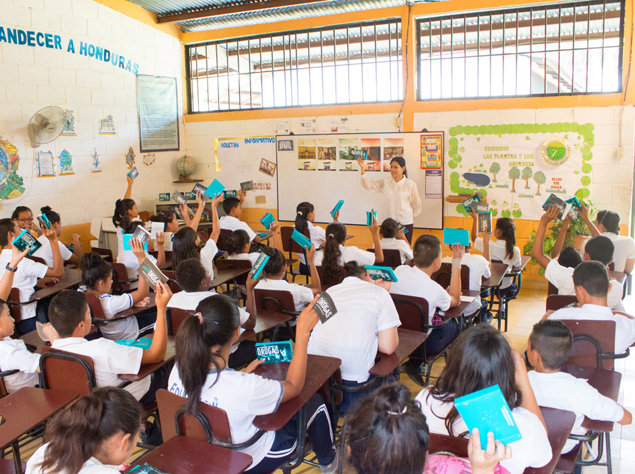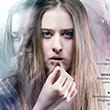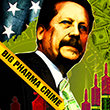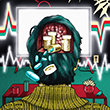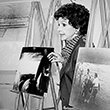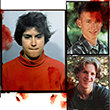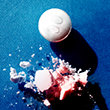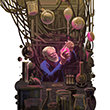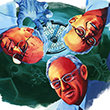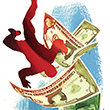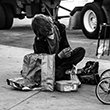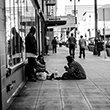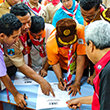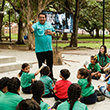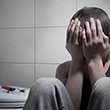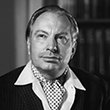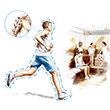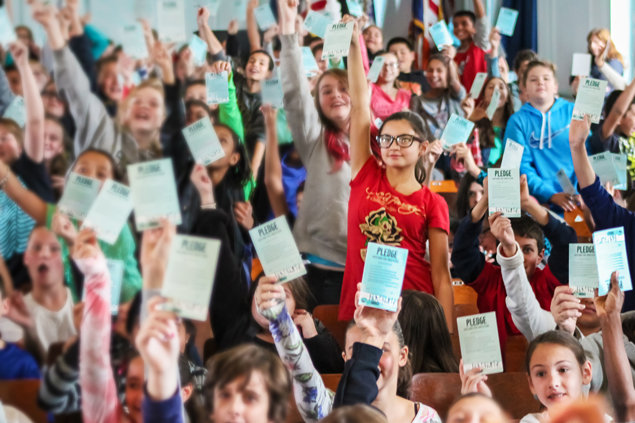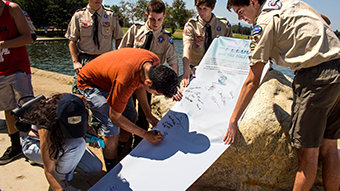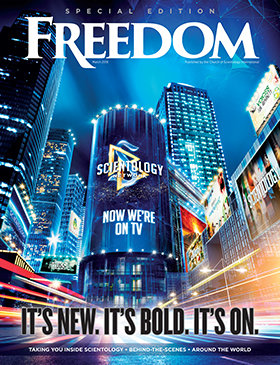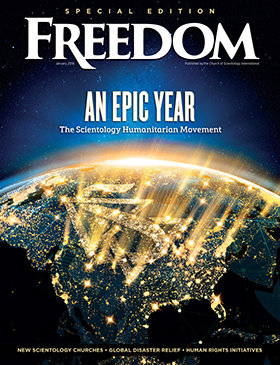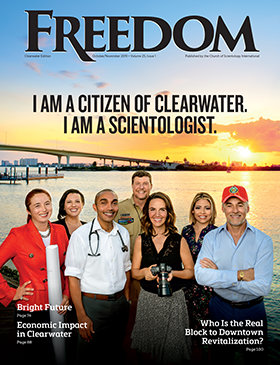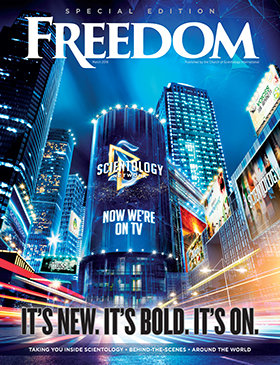A boy of about 12 looks straight at the camera. He has shaggy bangs and an upturned nose that people—surely to his chagrin—must often describe as adorable. He wears the deliberately rumpled uniform of youth: jeans, a T-shirt and the ubiquitous hoodie. He could be your child.
“They said one hit wouldn’t hurt,” says the boy.
A montage of familiar childhood scenes follows: The boy playing with friends on a soccer field. The boy horsing around in the halls at school. There’s also images of the less seemly features of adolescence: The boy struggling to fit in with those friends on that field. The boy wandering those halls looking overwhelmed.
Cut to his mother in her kitchen. She answers a phone call, wincing as she hears its news. Then, the boy is on a stretcher, being rushed into an emergency room. Mom drives frantically to the hospital. The final, heart-wrenching shot shows a doctor pulling a sheet over the boy’s button nose, covering his head.
“They lied.”
It is the boy’s mother now that speaks to the camera, her son’s voice from beyond the grave. “Get your kids the truth about drugs.”
The public service announcement, titled “One Hit,” lasts only 45 seconds, but its message speaks volumes. A school-age child uses drugs for the first time every 17 seconds, the latest victim of a global epidemic. The United Nations estimates that, worldwide, drug abuse kills 200,000 people annually.
Research suggests that people who reach age 21 without using are unlikely to ever use drugs, and so are spared. Studies also show that young people are less likely to use drugs when they are educated on the dangers.
The Foundation for a Drug-Free World campaign, sponsored by Churches of Scientology and Scientologists, reaches young people before they take that “one hit,” with award-winning public service announcements like the one featuring the ill-fated boy, and a wide range of materials and activities that include informational booklets covering the most commonly used drugs; a feature-length documentary film; educator kits for classroom or community use; and a comprehensive online resource center.
An international network of Scientologists and volunteers from every faith and walk of life spread The Truth About Drugs message—in 19 languages—partnering with schools, community groups, law enforcement and government agencies around the world for broad-scale implementation, empowering young people everywhere to make their own informed decision to live drug-free.
The Truth About Drugs campaign is the world’s largest nongovernmental drug information and prevention initiative. Chapters around the world held 45,000 events participated in by 38 million people. More than 7 million The Truth About Drugs booklets were distributed throughout the year—exceeding 77 million total since they were first published in 2006.
The program effectively communicates the reality of drug abuse to teens and young adults, both one-to-one and through mass communication. The Truth About Drugs materials are smart, they’re hip-speaking to this audience in such a way that they will listen, by having peers deliver the message. It is young people—some of whom have gone down the path of addiction themselves and survived to tell the story—who deliver the no-holds barred anti-drug message in a variety of The Truth About Drugs print, film and online assets.
The Truth About Drugs: Real People, Real Stories documentary features young people who have been there, done that and survived—focusing on 12 of the most commonly abused substances: marijuana, alcohol, synthetic drugs, Ecstasy, cocaine, crack, crystal meth, inhalants, heroin, LSD, prescription drugs and painkillers. It presents hard-hitting facts: what makes a drug a drug, the effects of the different substances on the mind and body, and the sad outcomes of lives led on drugs.
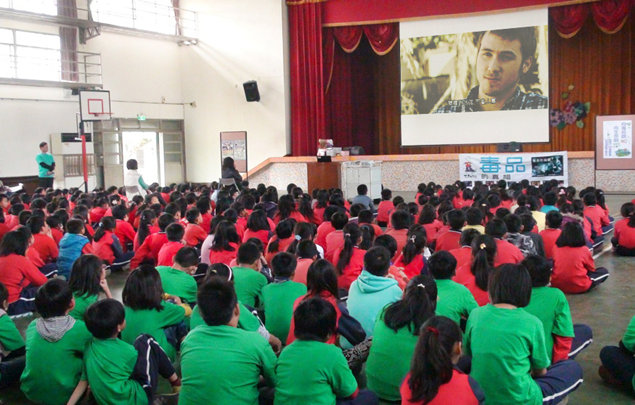
The “They Said/They Lied” series of 17 public service announcements features young people in gritty depictions of the destructive effects of the most prevalent “drugs of choice.” They are aired around the world, on television, in schools and in a variety of public venues, with the goal of cutting rates of drug use.
The Truth About Drugs booklet series is 14 powerful drug-education publications that present the unvarnished truth about the short‑term and long‑term consequences of drug use and effectively dispelling myths such as “one hit won’t hurt.” Each of the booklets is dedicated to one commonly abused drug and its ill effects, offering supporting statistics and compelling stories from former users. The booklets are available individually or as a boxed set and have been translated into more than 20 languages and distributed across 188 countries.
The Truth About Drugs Education Package combines these tools into a complete curriculum that enables teachers, guidance counselors, law enforcement officers, community mentors, and volunteer drug prevention specialists to further spread the truth about drugs. It includes The Truth About Drugs: Real People, Real Stories documentary film, 24 boxed sets of The Truth About Drugs booklet series; 12 “They Said/They Lied” posters; and an educator’s guide with a full semester of lesson plans, essay prompts and homework assignments, all designed to elicit student participation.
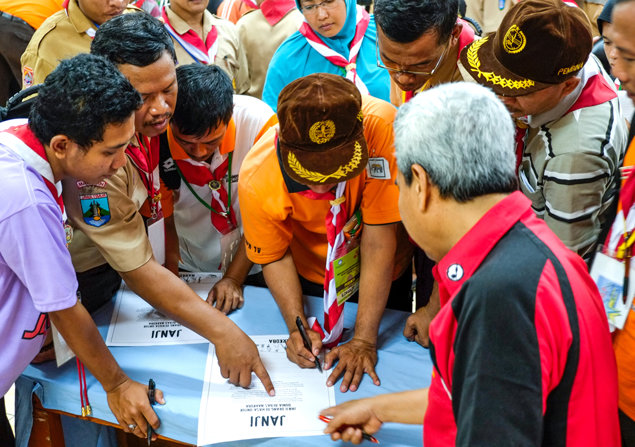
The complete educational program is also offered as a digital curriculum and in a The Truth About Drugs virtual classroom, which is available online or as apps for the iPad and iPhone. Similarly, all resources of The Truth About Drugs, the full-length documentary film, PSAs, downloadable booklets and printable posters are available online at drugfreeworld.org.
The range of The Truth About Drugs resources makes the program flexible. Its different components can be used alone or together, as add-ons to existing community drug education initiatives or to originate and implement new programs. Thanks to the support of Scientologists and Churches of Scientology, all The Truth About Drugs materials are provided free of charge to anyone, anywhere who wants to use them to curtail usage in their community. As it turns out, that’s a lot of people in a lot of places.
Behind the scenes, the Church of Scientology’s massive, state-of-the-art International Dissemination and Distribution Center in Los Angeles prints, produces and packages the materials, and ships them to destinations around the world.
The materials are easy to implement, reflected in the variety of ways they are used. Individuals, community organizers, and law enforcement agencies have had great success distributing The Truth About Drugs booklets at public events and community gathering places, staging drug-free pledge signing events and showings of The Truth About Drugs documentary chapters, and using the ready-made curriculum in The Truth About Drugs Educator’s Guide to deliver seminars or courses on any of 13 different drugs.
The Foundation for a Drug-Free World partners with a variety of stakeholders around the world to put the materials of The Truth About Drugs into action. Thousands of educational institutions and government, law enforcement, education and community agencies in more than 50 countries use The Truth About Drugs materials in their drug prevention efforts.






Multimedia
Campaign
Perhaps more than any other group, law enforcement agencies deal with the daily reality of the drug crisis, and are among the staunchest proponents of The Truth About Drugs around the world and right here at home. In the U.S. alone, 1,200 police departments in every state use The Truth About Drugs program.
Personal freedom is a core value of the Scientology religion, and its mission is global betterment. This is why its charitable activities focus on social programs rooted in education. The Truth About Drugs is one of those programs, teaching young people about the dangers and consequences of drug use, and arming them with the information they need to make their own choices to be drug-free. And though it has reached millions, Scientologists around the world whose contributions power the program also measure its success on a smaller scale. Each and every young person they reach, every child who never takes that “one hit” is “one hit” to the enemy—the worldwide scourge of drugs—and is one step closer to overcoming it for good.
To learn more about the program or order free The Truth About Drugs program materials, visit drugfreeworld.org, write info@drugfreeworld.org or call 1-888-668-6378. From outside the U.S., call +1 818-952-5260.
